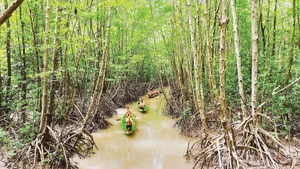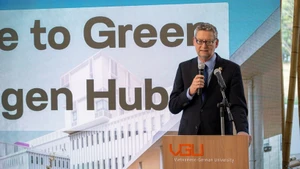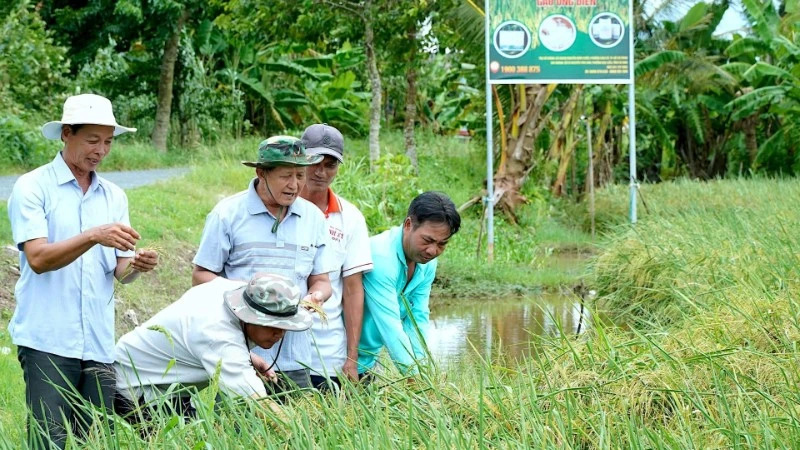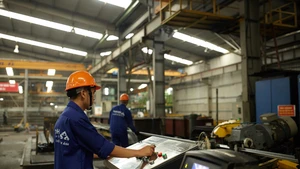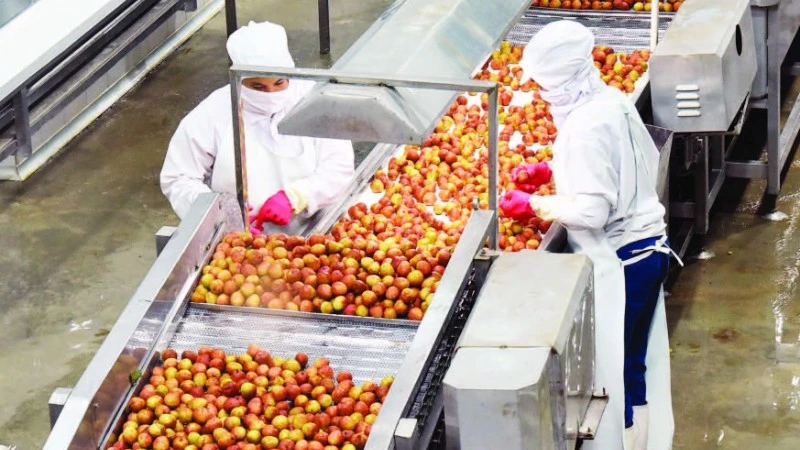With an abundance of such resources, Viet Nam holds significant potential to develop a bioplastics industry rooted in a circular economy—one that reduces pollution while enhancing the competitiveness of domestic enterprises within the global supply chain.
From agricultural waste to future materials
Plastic waste poses a formidable challenge not only for Viet Nam but globally. Despite numerous recycling initiatives, the volume of untreated waste continues to rise.
Viet Nam generates over 45 million tonnes of agricultural by-products annually, including straw, rice husks, corn husks, sugarcane bagasse, coconut fibres, and coffee husks. Much of this material is either incinerated or discarded, contributing to environmental degradation.
In response, several enterprises are striving to “turn waste into gold” by developing technologies that transform these by-products into fully biodegradable bioplastics, gradually replacing petroleum-based plastics.
As part of the agricultural ecosystem linked to the coffee industry, Thanh Long Bioplastic has direct access to vast quantities of agricultural waste such as coffee husks and residues from corn, cassava, and bamboo.
Several enterprises are striving to “turn waste into gold” by developing technologies that transform these by-products into fully biodegradable bioplastics, gradually replacing petroleum-based plastics.
Rather than allowing these materials to go to waste, the company purchases them—providing additional income for farmers and addressing waste issues at the source.
These by-products are converted into bioplastic compound pellets—materials with clear biological origins and full biodegradability, leaving no microplastics in the environment. Thanh Long Bioplastic invests in advanced mixing technologies and enforces stringent quality control to produce a variety of pellets suitable for packaging, cutlery, straws, and other eco-friendly consumer goods.
The company’s mission is to help customers transition smoothly to sustainable materials without compromising production efficiency or economic viability.
Similarly, the start-up BUYO Bioplastics is pursuing the “biologisation” of materials, producing bioplastics from sugarcane bagasse and spent grain. These products decompose entirely in natural environments within three to twelve months.
Not only are they safe for both the environment and human health, but they also retain functional performance at competitive prices. Moreover, the manufacturing process conserves energy and minimises greenhouse gas emissions.

Another innovative approach comes from AirX Carbon, which manufactures industrial pallets using coconut shells and rice husks. These pallets—essential in logistics—are produced using NetZero Pallet technology. Capable of bearing loads of up to five tonnes, they reduce costs by 20–50%, save 70% in storage space, and improve transport efficiency by up to 300%.
This initiative not only tackles environmental concerns but also enhances supply chain performance, earning praise from numerous enterprises. These models demonstrate that, with appropriate investment, agricultural waste can serve as the foundation for a burgeoning green materials industry.
Expanding opportunities and overcoming challenges
Viet Nam consumes approximately 12 billion USD worth of plastic products annually. Replacing these with bioplastics could reduce carbon dioxide emissions by around 12 million tonnes, equating to an estimated annual saving of 60 million USD.
However, bioplastics have yet to achieve widespread adoption due to cost and policy-related barriers. Typically, bioplastics cost 1.5 to 2 times more than traditional plastics, and consumers are not yet inclined to pay a premium for environmentally friendly alternatives.
The absence of mandatory regulations or targeted incentives has resulted in limited motivation for businesses to transition. At present, there is no clear roadmap for phasing out conventional plastics, nor are there effective sanctions against polluting products.
In response, BUYO Bioplastics is scaling up production and refining its technology to reduce costs and enhance competitiveness. CEO and co-founder Do Hong Hanh stated that the company aims to export to Asia, Europe, and North America—regions where environmental standards are increasingly stringent. Amid tightening import regulations from the EU, the Republic of Korea, Japan, and other countries, bioplastics are viewed as a “low-carbon passport” for Vietnamese firms seeking access to global supply chains.
Beyond meeting technical specifications, bioplastics help elevate brand value, mitigate environmental risks, optimise long-term costs, and demonstrate corporate social responsibility.

Experts suggest that to seize this opportunity, Vietnamese businesses must invest in technology, build sustainable supply chains, collaborate with like-minded partners, and enhance public awareness to promote green consumption—particularly in urban areas, supermarkets, restaurants, and schools.
To address cost-related challenges, Thanh Long Bioplastic continues to optimise its production processes to make bioplastics a financially viable solution.
CEO Nguyen Hoang Duong emphasised that, with self-sufficient raw materials and modern technology, the company is confident in its ability to produce high-quality products that meet market demands.
“We believe bioplastics not only enable Vietnamese businesses to expand globally but also reflect our commitment to a green and sustainable Viet Nam, contributing to the Net Zero 2050 goal,” he affirmed.
We believe bioplastics not only enable Vietnamese businesses to expand globally but also reflect our commitment to a green and sustainable Viet Nam, contributing to the Net Zero 2050 goal.
Thanh Long Bioplastic CEO Nguyen Hoang Duong
The sustainable development of the bioplastics sector cannot rely solely on business initiatives; it requires a comprehensive innovation ecosystem encompassing policy, infrastructure, finance, education, and market development.
Investing in innovation centres for green materials, supporting the commercialisation of research from universities and institutes, and establishing specialised industrial clusters for biodegradable materials are essential steps to drive the transition.
The National Startup Support Centre advocates for the prompt introduction of specific legal frameworks for bioplastics, the imposition of environmental taxes on traditional plastics, mandatory reduction timelines, and tax incentives for businesses using bio-based materials or achieving international sustainability certifications. Additionally, it recommends financial support for testing and leasing premises within green industrial zones.
Businesses hope that forthcoming policies will integrate “green” criteria into start-up programmes, trade promotion, and exhibitions—prioritising environmentally friendly products. Material transition not only reduces emissions and protects the environment but also paves the way for green growth and sustainable development.

